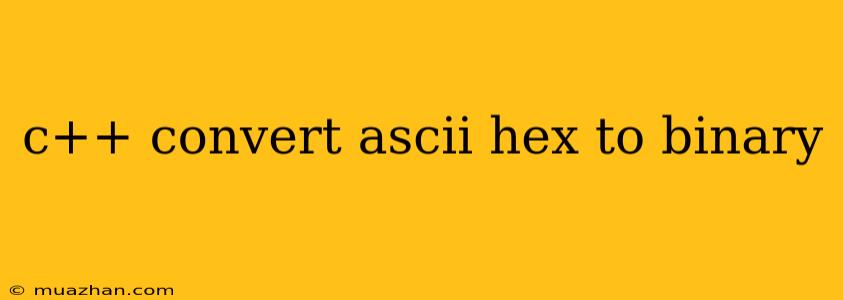Converting ASCII Hex to Binary in C++
This article will guide you through the process of converting ASCII hexadecimal values to binary strings in C++. We will cover two main approaches: using built-in functions and implementing a custom solution.
Understanding ASCII Hex and Binary
ASCII (American Standard Code for Information Interchange) is a character encoding standard that assigns numerical values to characters. Each character is represented by a unique decimal value, which can be further expressed in hexadecimal or binary forms.
Hexadecimal is a base-16 number system using digits 0-9 and letters A-F (representing 10-15). It's often used in computer programming due to its compact representation.
Binary is a base-2 number system, using only 0 and 1. This is the fundamental language computers understand.
Method 1: Using Built-in Functions
C++ offers various functions for number conversions, simplifying the process. Here's a breakdown:
-
std::stoi: This function converts a string to an integer. We can utilize it to convert the ASCII hexadecimal string to a decimal integer. -
std::bitset: This class allows us to store and manipulate binary values. By passing the decimal integer to thebitsetconstructor, we can represent it as a binary string.
Code Example:
#include
#include
#include
int main() {
std::string hex_string = "41"; // ASCII hex for 'A'
int decimal_value = std::stoi(hex_string, nullptr, 16); // Convert hex to decimal
std::bitset<8> binary_value(decimal_value); // Create a binary representation
std::cout << "Hexadecimal: " << hex_string << std::endl;
std::cout << "Binary: " << binary_value << std::endl;
return 0;
}
Output:
Hexadecimal: 41
Binary: 01000001
Method 2: Custom Implementation
For a more in-depth understanding, we can implement our own conversion logic. This involves converting each hexadecimal digit to its equivalent binary representation and then concatenating them.
Code Example:
#include
#include
std::string hex_to_binary(const std::string& hex_string) {
std::string binary_string;
for (char c : hex_string) {
switch (c) {
case '0': binary_string += "0000"; break;
case '1': binary_string += "0001"; break;
case '2': binary_string += "0010"; break;
// ... add cases for 3 to 9
case 'A': binary_string += "1010"; break;
case 'B': binary_string += "1011"; break;
case 'C': binary_string += "1100"; break;
// ... add cases for D to F
default:
std::cerr << "Invalid hexadecimal character: " << c << std::endl;
return "";
}
}
return binary_string;
}
int main() {
std::string hex_string = "41";
std::string binary_string = hex_to_binary(hex_string);
std::cout << "Hexadecimal: " << hex_string << std::endl;
std::cout << "Binary: " << binary_string << std::endl;
return 0;
}
Output:
Hexadecimal: 41
Binary: 01000001
Conclusion
Both methods successfully convert ASCII hexadecimal values to binary strings. Choosing the appropriate approach depends on the desired level of control and optimization. For basic conversions, the built-in functions offer a concise solution. For custom implementation and advanced scenarios, you can leverage your own conversion logic for greater flexibility.
